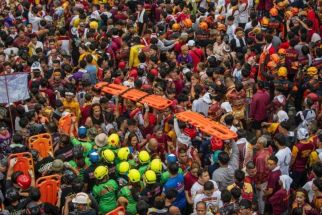Pinoys in Kuwait-Iraq border staying on and staying strong
April 3, 2003 | 12:00am
Across the desert sand and distant ocean, Filipinos are linked by the sounds of war: Air-raid sirens, explosions and the urgent ringing of phones.
"Mommy, do you also carry around a gun there?" This innocent question asked by the four-year-old daughter of overseas Filipino worker (OFW) Cynthia Bustillos-Cabantoc, 33, prompted her to assure her family she is safe. Cynthia works in the Kuwaiti province of Jahra, close to the Iraqi border.
The child’s question was prompted by television footage of gun-toting, United States-led coalition soldiers preparing for war in Iraq two weeks ago and she asked her mother to come home, even without toys or pasalubong (homecoming gifts).
Cynthia, who has worked in Kuwait for the last three years, told The STAR, "I worry about what is going through my daughter’s mind. My husband was able to explain things to her, but other ideas may have taken root in her mind." Her younger daughter is just over a year old.
Like countless other OFWs in the Middle East who chose not to leave despite the war, Cynthia and her fellow medical technologists at the Al Jahra Hospital are more concerned about the welfare of their families back home.
Of the 1.5 million OFWs in the Middle East, 60,000 are located in Kuwait. At the Al Jahra Hospital, 150 nurses, 50 medical technologists and 19 radiologists are OFWs.
Cynthia, a coordinator for the Middle East Preparedness Team (MEPT) in Kuwait, said she opted to stay despite the early rumblings of war last year for fear she would lose her job.
"I set my fear aside for my family’s welfare," Cynthia said.
Lita Deveratuda, 61, faces war in the Middle East for the second time. She has worked in Kuwait for 21 years, with the Farwaniya Hospital from 1981 to 1989, then, later the Al Jahra Hospital.
Lita retires in July and has decided to await her retirement rather than leave Kuwait while the getting was good.
She went through the 1991 Gulf War and the anxiety over this new war awakens painful and frightening memories.
Lita fled the fighting in 1991 by taking refuge in Amman, Jordan. Her father, unable to bear his anxiety over her safety, died and was buried two days before she got home.
According to Lita, her most frightening memory of the 1991 Gulf War was of seeing fully armed Iraqi soldiers, army trucks and missile launchers on Kuwaiti soil.
"I don’t like war," Lita said. "I had already experienced one which left bad memories. But, since it’s already there, the best thing we could do is pray for (the war) to be over soon and not spread to nearby countries."
The medical staff in Kuwait will be the last set of OFWs to relocate to Bahay Pinoy, in Nuwaiseeb on the border of Kuwait and Saudi Arabia, should conflict spill over into Kuwait, the main launching pad of the coalition strike on Iraq.
The Filipinos in Kuwait said they are reassured by the presence of MEPT chief and special envoy Roy Cimatu, who makes frequent personal visits with the OFWs there and personally oversees the implementation of the MEPT contingency plans.
Despite the barrage of missiles launched by Iraq at Kuwait, OFWs here share a feeling of safety and security generated by the massive military presence in the emirate.
Despite this massive military presence and the air defense system that stopped most of the Iraqi missiles, one missile, a silkworm, was launched undetected and hit a shopping mall in Kuwait city Saturday night, injuring two people.
Had the missile hit in the daytime, when the mall is full of people, the OFW casualties could have been steep.
Angie Corvera, a medical technologist at the Al Jahra Hospital and the elder sister of this reporter, said fear gripped her and other OFWs there when they first heard the "wavy siren" warning of a missile attack. The first Iraqi Scud missile launched at Kuwait was intercepted by a US Patriot missile.
Air raid sirens are now a regular sound there and is part of "day-to-day living" in Kuwait, Cynthia said. The klaxon and the distant impact of an Iraqi missile brought abruptly to earth still sends shudders through the OFWs in Al Jahra Hospital and they can only relax when they hear the "straight siren" sounding the all clear.
"Mommy, do you also carry around a gun there?" This innocent question asked by the four-year-old daughter of overseas Filipino worker (OFW) Cynthia Bustillos-Cabantoc, 33, prompted her to assure her family she is safe. Cynthia works in the Kuwaiti province of Jahra, close to the Iraqi border.
The child’s question was prompted by television footage of gun-toting, United States-led coalition soldiers preparing for war in Iraq two weeks ago and she asked her mother to come home, even without toys or pasalubong (homecoming gifts).
Cynthia, who has worked in Kuwait for the last three years, told The STAR, "I worry about what is going through my daughter’s mind. My husband was able to explain things to her, but other ideas may have taken root in her mind." Her younger daughter is just over a year old.
Like countless other OFWs in the Middle East who chose not to leave despite the war, Cynthia and her fellow medical technologists at the Al Jahra Hospital are more concerned about the welfare of their families back home.
Of the 1.5 million OFWs in the Middle East, 60,000 are located in Kuwait. At the Al Jahra Hospital, 150 nurses, 50 medical technologists and 19 radiologists are OFWs.
Cynthia, a coordinator for the Middle East Preparedness Team (MEPT) in Kuwait, said she opted to stay despite the early rumblings of war last year for fear she would lose her job.
"I set my fear aside for my family’s welfare," Cynthia said.
Lita Deveratuda, 61, faces war in the Middle East for the second time. She has worked in Kuwait for 21 years, with the Farwaniya Hospital from 1981 to 1989, then, later the Al Jahra Hospital.
Lita retires in July and has decided to await her retirement rather than leave Kuwait while the getting was good.
She went through the 1991 Gulf War and the anxiety over this new war awakens painful and frightening memories.
Lita fled the fighting in 1991 by taking refuge in Amman, Jordan. Her father, unable to bear his anxiety over her safety, died and was buried two days before she got home.
According to Lita, her most frightening memory of the 1991 Gulf War was of seeing fully armed Iraqi soldiers, army trucks and missile launchers on Kuwaiti soil.
"I don’t like war," Lita said. "I had already experienced one which left bad memories. But, since it’s already there, the best thing we could do is pray for (the war) to be over soon and not spread to nearby countries."
The medical staff in Kuwait will be the last set of OFWs to relocate to Bahay Pinoy, in Nuwaiseeb on the border of Kuwait and Saudi Arabia, should conflict spill over into Kuwait, the main launching pad of the coalition strike on Iraq.
The Filipinos in Kuwait said they are reassured by the presence of MEPT chief and special envoy Roy Cimatu, who makes frequent personal visits with the OFWs there and personally oversees the implementation of the MEPT contingency plans.
Despite the barrage of missiles launched by Iraq at Kuwait, OFWs here share a feeling of safety and security generated by the massive military presence in the emirate.
Despite this massive military presence and the air defense system that stopped most of the Iraqi missiles, one missile, a silkworm, was launched undetected and hit a shopping mall in Kuwait city Saturday night, injuring two people.
Had the missile hit in the daytime, when the mall is full of people, the OFW casualties could have been steep.
Angie Corvera, a medical technologist at the Al Jahra Hospital and the elder sister of this reporter, said fear gripped her and other OFWs there when they first heard the "wavy siren" warning of a missile attack. The first Iraqi Scud missile launched at Kuwait was intercepted by a US Patriot missile.
Air raid sirens are now a regular sound there and is part of "day-to-day living" in Kuwait, Cynthia said. The klaxon and the distant impact of an Iraqi missile brought abruptly to earth still sends shudders through the OFWs in Al Jahra Hospital and they can only relax when they hear the "straight siren" sounding the all clear.
BrandSpace Articles
<
>
- Latest
- Trending
Trending
Latest
Trending
Latest
Recommended





























